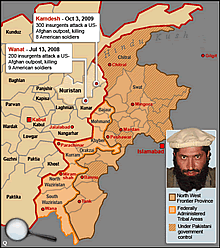Al Qaeda, Taliban create female suicide cells in Pakistan and Afghanistan
 |
Qari Zia Rahman and a map of northeastern Afghanistan and northwestern Pakistan. Map from the Asia Times; click to view. |
The Taliban and al Qaeda have established female suicide bombing cells in remote areas of northwestern Pakistan and northeastern Afghanistan. The female suicide bombers have struck in both Pakistan and Afghanistan.
The existence of the cells, which appeared evident after female suicide bombers attacked twice over the past five months in Afghanistan and Pakistan, was confirmed by a 12-year-old Pakistani girl named Meena Gul.
Gul, who said she was trained to be a "human bomb," was detained by Pakistani police in the Munda area in Pakistan's northwestern district of Dir, according to the Times of India.
"Gul said that women suicide bombers were trained for their deadly task in small cells on both sides of the porous border and were dispatched to their missions with a sermon, 'God will reward you with a place in heaven.'"
Gul said her cell was led by Zainab, her sister-in-law, who dressed as a man and fought alongside the Taliban against Pakistani troops.
Prior to the two attacks in Afghanistan and Pakistan this year, there have been no recorded instances of female suicide bombers carrying out attacks in either country.
A female suicide bomber struck for the first time in Afghanistan in Kunar province on June 21, 2010. Two US soldiers were killed and two Afghan children were wounded in the attack. Gul claimed her younger sister carried out that attack.
The next female suicide attack took place on Dec. 24, 2010, in Pakistan's tribal agency of Bajaur. The suicide bomber killed 42 Pakistani civilians in an attack at a World Food Program ration distribution point.
The Taliban and al Qaeda cells are under the command of Qari Zia Rahman, the dual-hatted Taliban and al Qaeda commander who operates on both sides of the Afghan-Pakistani border. Qari Zia claimed credit for the June 2010 suicide attack in Kunar.
Qari Zia is the Taliban's top regional commander as well as a member of al Qaeda. He operates in Kunar and in neighboring Nuristan province in Afghanistan, and he also operates across the border in Pakistan's tribal agency of Bajaur. Earlier this year, the Pakistani government claimed they killed Qari Zia in an airstrike, but he later spoke to the media and mocked Pakistan's interior minister for wrongly reporting his death.
Qari Zia is closely allied with Faqir Mohammed, the Taliban's leader in Bajaur, as well as with Osama bin Laden. Qari Zia's fighters are from Chechnya, Uzbekistan, Turkmenistan, Afghanistan, and various Arab nations. He commands a brigade in al Qaeda's paramilitary Shadow Army, or the Lashkar al Zil, US intelligence officials have told The Long War Journal.
Background on the hunt for Qari Zia Rahman and al Qaeda in Kunar
The US has targeted Qari Zia in multiple raids in Kunar over the summer and fall of 2010, but has failed to kill or capture him. In late July and early August, ISAF announced that it was hunting Qari Zia Rahman. The US has targeted Qari Zai in three raids over the past summer. On June 29, the US launched a battalion-sized operation in Kunar's Marawara district, which directly borders Pakistan. More than 150 Taliban fighters were reported killed in the operation. On July 20, US and Afghan forces launched another battalion-sized operation in Marawara to flush out Qari Zia. And on Aug. 2, combined forces conducted a raid, again in Marawara, that targeted the al Qaeda leader.
The top al Qaeda commander in Kunar province is Abu Ikhlas al Masri, an Egyptian who has spent years in Afghanistan and has intermarried with the local tribes. Abu Ikhlas is al Qaeda's operations chief for Kunar province, having assumed command after Abu Ubaidah al Masri was promoted to take over al Qaeda's external operations branch (Abu Ubaidah died in early 2008 of a disease).
The US military has killed three senior al Qaeda leaders in Kunar this fall. On Sept. 25, a US airstrike killed a senior al Qaeda leader named Abdallah Umar al Qurayshi and an "explosives expert" named Abu Atta al Kuwaiti, along with "several Arabic foreign fighters." Sa'ad Mohammad al Shahri, a longtime jihadist and the son of a retired Saudi colonel, is also thought to have been killed in the same strike.
Kunar province is a known sanctuary for al Qaeda and allied terror groups. The presence of al Qaeda cells has been detected in the districts of Pech, Shaikal Shate, Sarkani, Dangam, Asmar, Asadabad, Shigal, and Marawana; or eight of Kunar's 15 districts, according to an investigation by The Long War Journal.
Read more: http://www.longwarjournal.org/archives/2010/12/al_qaeda_taliban_create_female_suicides_cell_in_pakistan_and_afghanistan.php#ixzz19jutgu6D









READER COMMENTS: "Al Qaeda, Taliban create female suicide cells in Pakistan and Afghanistan"